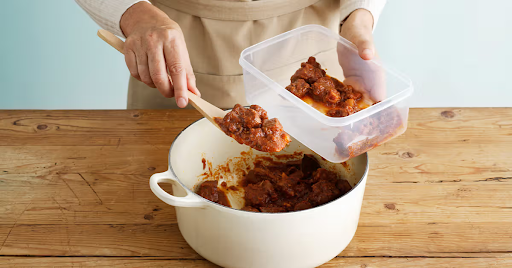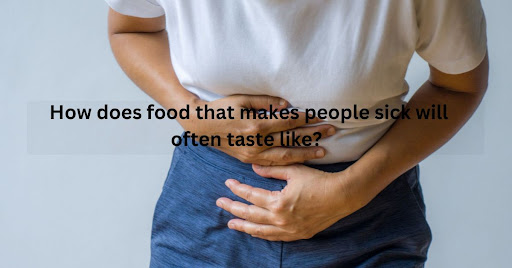You may have encountered situations wherein a family member may have asked you to taste a food to reconfirm if it’s stale or not. It is quite a frequent affair, and many times, what may taste as woody and bland to someone may seem right to the other. But the problem here is – that if you cannot figure out the quality of food by the taste, that could result in an upset stomach and, in certain cases, even lead to food poisoning. Having said that, the food that makes people sick will often taste slightly bitter or comparatively sharper and even smell woody at times.
But is it the same for all? What if it tastes normal but smells a little woody? How to differentiate between bad food that would make you sick and food that may have been kept in the fridge but is still worth consuming? We’ll answer all your queries in a categorical manner in this article. Let’s start –
Food that makes people sick will often seem like?
Have you been categorically looking at foods that make people sick? They taste or smell like –
1. The food tastes way sharper

Do you know that the salvia in your mouth is a little sour? Well, the point made here is that if the food’s taste is sharper than that (without any added condiments), then there is a high chance that the food has become stale and will cause you to become sick. Hence, steer clear of foods that taste like this.
2. Its smell is a strangely wood-like

Normally, food products stored over a certain period get a certain smell to them. However, if the food starts smelling wood-like, it’s time to discard it, as it has turned bad.
3. It might be a little bumpy with an odd shade

Another thing about recognizing stale food is that – it becomes a little bumpy with an odd shade. This happens primarily because a fungus overgrowth is on top of the food. After a certain period, most foods do not change in terms of smell but start developing a fungal composition. When you notice such foods, it is best to dispose of them since they could lead to food poisoning.
4. It tastes the same
This is the trickiest of the lot! As you know already, food that makes people sick will often taste and smell different (as mentioned above). But there are chances that certain foods will not change their external composition despite it rotting inside. To prevent yourself from becoming sick, you must not eat packet-wrapped cooked food that is over 4-5 days old (if not categorically mentioned that it can be eaten for an extended period).
Why has the food become so?
Are you wondering as to why food that makes people sick will often taste or smell differently? It’s simply because the food has lost its nutritional value, and has now turned into the hub of bacteria and germs, rather than a piece of sumptuous nutrition. It is time you concentrate on the reasons behind the same –

1. Uncooked food/food not being cooked in the correct way
If you have not cooked the food well or used clean utensils or good-quality spices for cooking, your food will not be cooked well. Also, chances of such foods staling are higher in these cases vis-a-vis others.
2. The food was not stored well
If the food was not packed and stored well, then the chances of its becoming stale, or its taste changing are more probable.
3. It is past its storage time
Every food has its own shelf life, despite how well you may store it. So, if it extends the same, then they might smell and taste differently.
What must you be concerned about?

There are a couple of things you must be concerned about since you already know how food that makes people sick will often come across. Firstly, check the ingredients and the utensils that you use for cooking. Secondly, if either the taste or the smell does not match the actual essence of the food and is a bit sharper than the normal taste (sharper in general and not due to a spice alteration), then that’s a food you 威而鋼
must be concerned about. That essentially could lead to food poisoning and other complications.
Parting thoughts
As you have already understood how food that makes people sick will often taste or even smell, the next thing you must know is how to prevent it from happening. In the aforementioned article, the experts have tried to outline the specifics of the same, and it is best if you follow suit. Also, when you scroll down this page, you will get answers to some queries that people mostly ask associated with this topic. You can always post questions in the comments section if you still have questions. Keep following this page for more exciting content like this.
Frequently Asked Questions
Q1. Food that makes people sick will often be like?
Ans. The taste is normally quite sharp or even bitter, and the smell is somewhat wood-like. At times, it may taste normal but might be contaminated from within. Hence, you need to be a little careful of the same.
Q2. Which foods help in avoiding sickness?
Ans. There are a couple of foods that help you recover from such food-borne illnesses. They are bananas, garlic, ginger, and berries. They are all-weather foods that help deal with any kind of stomach issue.
Q3. How to store food for longer periods?
Ans. If you want to store foods longer without them becoming stale, you must wrap them first with food-quality silver wrapping paper and then pack them in air-tight containers. Even then, not every food has a capacity to stay over 4-5 days. That is the maximum period. In other cases, follow the given directions.
Q4. Do certain foods naturally change in taste?
Ans. Lastly, you must keep in mind that there are certain foods that naturally change in taste and smell over time. Especially organic foods have a limited shelf life and they change in consistency over time. These do not come under the ‘stale’ category.




